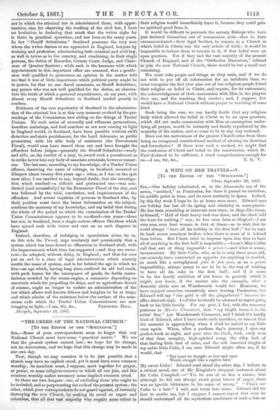"THE CREED OF THE NATIONAL CHURCH."
LTO THE EDITOR OF THE "SPECTATOR."] Sin,—Some of your correspondents seem to forget that any National Church must have some "practical centre." We see that the present system cannot last; we hope or its change, not its destruction, and we hope that this change may be made in our own day.
Now, though we may conceive it to be just possible that a church may have no explicit creed, yet it must have some common worship ; its members mast, I suppose, meet together for prayer, or praise, or some religious exercise in which all can join, and this common worship makes necessary some implicit common creed.
So there are two dangers : one, of excluding those who ought to be included, and so perpetuating the evils of the present system; the other, which your correspondents de not guard against, of instantly destroying the new Church, by making its creed so vague and colourless, that all that vast majority who reguire some coloar in their religion would immediately leave it, because they could gain no spiritual good from it. • It would be difficult to persuade the seventy Bishops who have just declared themselves out of communion with—that is, have excommunicated—their legal brother, to remain in a Church in which belief in Christ was the only article of faith ; it would be impossible to induce them to remain in it, if that belief were an open question. Yet if they and the vast majority of the present Church of England, and of the "Orthodox Dissenters," refused to join the new National Church, there would be but a small sect remaining.
We must take people and things as they exist, and if we do not wish to put off all reformation for an indefinite time, we must recognize the fact that nine out of ten religious people found their religion on belief in Christ, and require, for its sustenance, the acknowledgment of their communion with Him in the prayers they use, and the teaching they receive ; and, I suppose, few would have a National Church without prayer or teaching of some kind.
Such being the case, we can hardly doubt that any religious body which allowed the belief in Christ to be an open question, which did not make communion with Him an assumption under- lying all prayer, would be instantly and finally repudiated by the majority of the nation, and so cease to be in any way national.
Does not the narrowness of the present Church arise from there being no recognized constitutional method of altering its doctrines and formularies? If there were such a method, we might find the confession of Christ and belief in His resurrection, which St. Paul declared to be sufficient, a creed comprehensive enough for






























 Previous page
Previous page